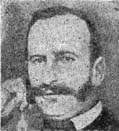Francisco Díaz (governor)
| Francisco Domingo Díaz Oro | |
|---|---|
 |
|
| Governor of San Juan Province, Argentina | |
|
In office 11 January 1855 – 18 March 1857 |
|
| Preceded by | Nazario Benavídez |
| Succeeded by | Nazario Benavídez |
| Governor of San Juan Province, Argentina | |
|
In office 1 March 1861 – 3 January 1862 |
|
| Preceded by | Filomeno Valenzuela |
| Succeeded by | Domingo Faustino Sarmiento |
| Personal details | |
| Nationality | Argentine |
| Political party | Federalist |
Francisco Domingo Díaz Oro was a colonel in the army of the Argentinian Confederation. He fought at the Battle of Angaco and was twice governor of San Juan Province, Argentina. He was a member of the Federalist Party but his administration was largely influenced by the Unitarian Party. His son Ramón Díaz was an outstanding lawman in La Rioja Province.
Francisco Domingo Díaz participated with the rank of colonel in the Battle of Angaco in the Federalist Cazadores Battalion, composed of troops from San Juan. He was placed in charge of the battalion at the start of the battle after the death of Colonel José Manuel Espinosa. Towards the end of the combat he was ordered by General José Félix Aldao to advance through a deep ditch with his infantry battalion of 350 men, accompanied by a similar number of men from the Mendoza Auxiliary Battalion, to take the artillery battery of the Unitarian Mariano Acha. Only 157 of the men from the two battalions survived. This battle, and this action, have been called the bloodiest of the Argentine Civil Wars.
On 4 January 1855 the Chamber of Representatives of San Juan accepted the resignation of governor Nazario Benavídez. On 21 January 1855, Díaz was appointed interim Governor. Díaz was later elected Governor in a popular vote. During his first term the first constitutional convention of the province was called, and a provincial constitution was issued in accordance with the Constitution of 1853. This was the first provincial constitution that defined the organization of the powers of the state, the functioning of institutions and electoral mechanisms. Its preamble did not invoke God as the source of all reason and justice, something unheard of at the time.
The reforms undertaken during his administration covered a wide spectrum: justice, politics, education, military and culture. The reforms caused problems with the judiciary, the Catholic Church and the military. The army was in charge of the caudillo Benavídez, who had been governor for twelve years before Díaz took office. Soon after taking office, Díaz appointed a commission to undertake the impeachment trial of Nazario Benavidez, the outgoing governor. The Commission declined to proceed.
...
Wikipedia
